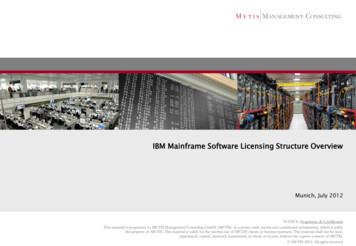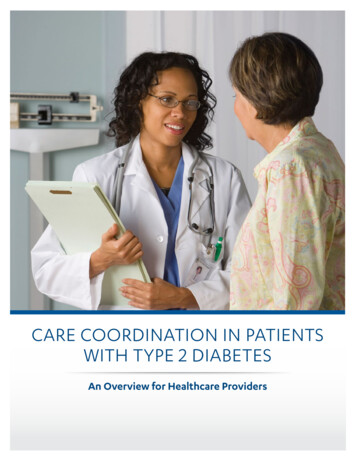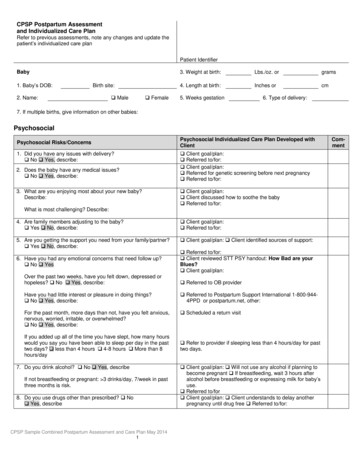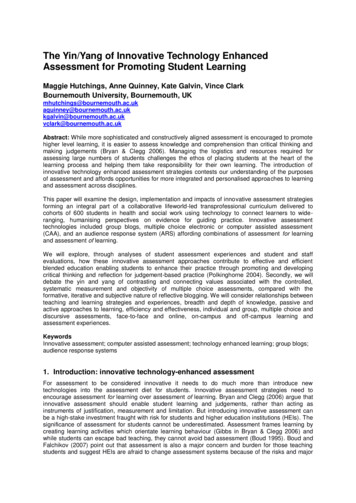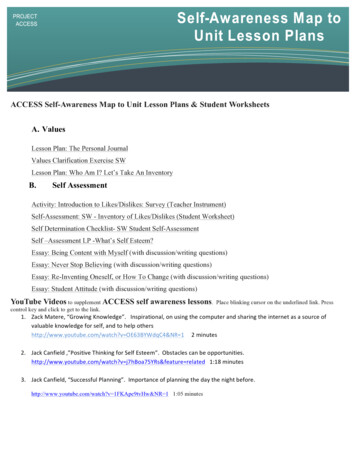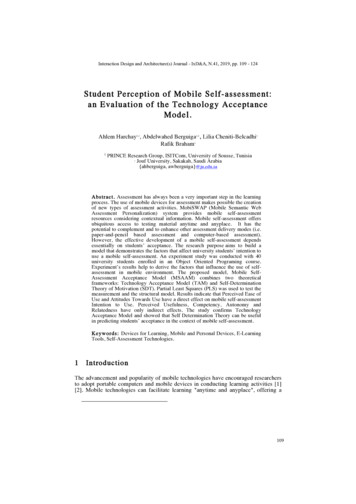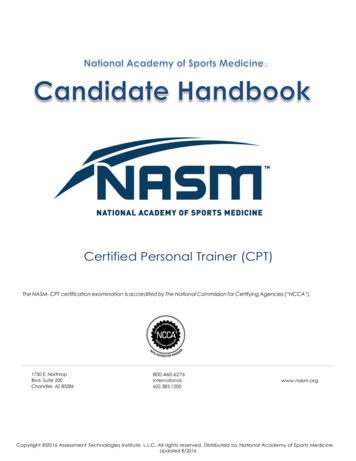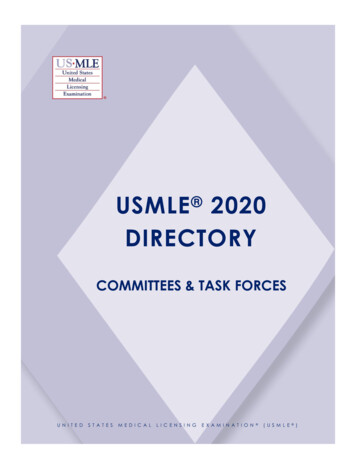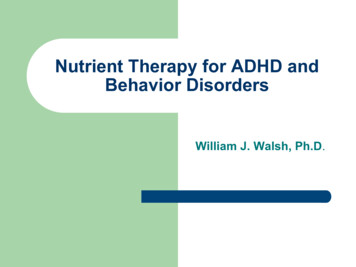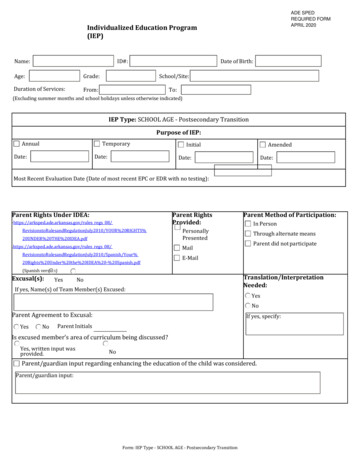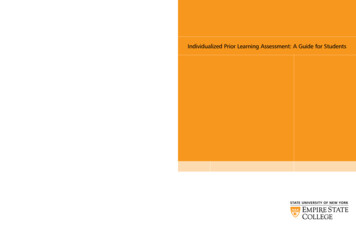
Transcription
Individualized Prior Learning Assessment: A Guide for Students2 Union Ave.Saratoga Springs, NY 13
suny empire state college individualized prior learning assessment1Individualized Prior Learning Assessment: A Guide for StudentsINTRODUCTIONIndividualized Prior Learning Assessment (iPLA) is the process by which studentsare able to explain and document their learning and be assessed by a qualifiedevaluator. Each year, more than 4,000 Empire State College students complete theiPLA process. Most students who go through the process find it satisfying, affirmingand worth the time and effort.Empire State College is committed that people should be awarded credit forverifiable college-level learning regardless of where or how it was acquired.Many Empire State College students have gained knowledge through sourcesthat are not previously validated by regionally accredited institutions ororganizations recognized by Empire State College. Learning that has not beenpre-evaluated by one of these sources can be evaluated through the individualizedPrior Learning Assessment process.iPLA can save you time and money.For current information on the feesassociated with individualized PriorLearning Assessment, please visitwww.esc.edu/Fees.The evaluation of individualized prior college-level learning is conducted within the context of your degree plan. As you develop yourdegree plan, you also will develop your iPLA requests. There are multiple steps in determining whether college credit may be awardedfor learning you have acquired from various life or work experiences.
2suny empire state college individualized prior learning assessmentSTEPS IN THE INDIVIDUALIZED PRIOR LEARNING PROCESSSteps in theiPLA ProcessYouStep 1 Identifyyour college-levelknowledge Work with your mentor Helps youidentify your Examine your experiencesand identify how yourcollege-levelknowledge fits best intoknowledgeyour degree planStep 2 Describeand documentyour learning Reviews your Prepare your learningiPLA requestdescription withand givessupporting documentation Propose a title, the number feedback,as neededof possible credits andcredits designations (e.g.,liberal arts and sciences,general education, level)Step 3 Submityour priorlearning request Reviews your Log onto PLA Plannerrequest and,through MyESC/if ready,Academics/Your DegreesubmitsPlan or www.esc.edu/PLAto COAR Set up your request(learning description,supporting materials,credit information andlink to degree plan) Submit your request toyour mentor for approvalStep 4 Requestis reviewed andassigned to anevaluator Step 5 A qualifiedevaluator assessesyour college-levellearning Your MentorCenter Office of Academic The EvaluatorReview (COAR)Office of CollegewideAcademic Review (OCAR) Reviews andapproves the creditrecommendation,as part of yourdegree plan review Approves the PLA creditsas part of the final review(concurrence) of yourdegree plan and officiallyposts your PLA credits inyour student record Provides free workshopson iPLA Provides assistance,as needed Reviews your iPLArequest and providesfeedback, as needed Reviews your requestand, if ready, assignsa qualified evaluator Reviews your request andchecks your degree planfor redundancy Interviews you regardingyour learning Contact the evaluator toset up your interview You are interviewed bythe evalautorStep 6 Theevaluator writesand submits a creditrecommendationreport Step 7 Thecollege reviewsand approves theevaluator’s creditrecommendationThe FacultyCommittee Requests additionalinformation ordocumentation, as needed The evaluator writesand submits a creditrecommendation report COAR reviews andincludes the evaluator’srecommendation reportin your degree plan
suny empire state college individualized prior learning assessment3Throughout the process, you will get feedback from your mentor, Center Office of Academic Review and the evaluator. You may beasked to make revisions or provide additional information based on this feedback. Their feedback is to help you provide greater clarityand stronger evidence of your learning. To keep the process moving, try to respond to questions as quickly as possible.ROLES IN THE iPLA PROCESSYou and the college have a role throughout the individualized Prior Learning Assessment process.Your role is to: reflect upon and self-assess your college-level learning describe and document your learning so that it can be evaluated revise, as needed, based on feedback meet with, and be interviewed by, a qualified evaluator provide any additional information.The college’s role is to: recognize which of your learning is college level evaluate and validate your college-level learning within the context of your degree plan credential your learning by assigning it an appropriate title and academic credits through the degree plan approval process.IDENTIFYING YOUR KNOWLEDGEWorking With Your MentorYour mentor and the Center Office of Academic Review are your resources as you review your learning and develop your requestfor credit.They will help guide you as to: the form, content and length of your learning description the amount of credit you should request the determination of how it fits into your degree program the supporting documentation you should include in your request.Throughout this process, you will work closely with your mentor to: develop realistic expectations regarding the kinds and amount of prior learning credit appropriate to your degree program plan determine if your prior learning is college level, appropriate for your degree program plan and not redundant with other learning review your learning description and supporting materials and make revisions based on your mentor’s feedback agree that the request is ready to be assessed and that your mentor will submit the request to the Center Office of AcademicReview through PLA Planner.You and your mentor will engage in early and ongoing conversations regarding your background, potential areas for prior learningassessment and potential areas for new learning – in other words, the overall scope of your degree program and plans for your newlearning. The college provides online, print and in-person resources that support you in this process. However, there is no substitute foryour ongoing conversation with your mentor.Examining Your ExperiencesThe college awards credit for demonstrated and verifiable college-level learning, not just for experience. This is an important concept tounderstand: credits are awarded for learning, not for experiences.
4suny empire state college individualized prior learning assessmentTo help understand the distinction between learning and experience, think about what you did today. Perhaps you got up, madebreakfast and got kids off to school. You got yourself ready and drove to work. When you got there, you read email, worked on areport, or met as part of a team. These actions are all experiences, but probably did not provide you college-level learning in themselves.However, that report may have required you to do research or data analyses that did require learning, or that team meeting may havebeen to discuss a problem you acquired new learning by solving. During the prior learning assessment process, you will be examiningyour experiences to find the learning that has occurred for you.Not all similar experiences have the same learning outcomes. For example, consider the following two students, Suzanne and Tom.They each own a restaurant and are involved in the day-to-day operations. Since their experience is similar, one might expect them tohave the same knowledge and skills, but that is not always true.Tom began cooking in the military and, after he returned to civilian life, focused on preparing gourmet meals. He started a localcooperative so he could buy fresh, local products. In addition, he learned a lot about nutrition because of some health problems and hasbeen incorporating this knowledge into menu choices.Suzanne focused totally on the business aspect of her restaurant. She does the accounting for the business, has developed a marketingplan and is trying to expand into a catering business. She also is on the board of the local homeless shelter, which she became involvedwith when she realized that some of the food not used by her restaurant could be donated.When these two students started to develop degree programs with their mentors and explore credit for prior learning, they discoveredthat they knew different things. Tom might focus his iPLA requests on nutrition, food preparation and running a cooperative. Suzannemight focus hers on her business skills and knowledge of community organizing.Both students also might be able to acquire prior learning credits through additional venues. For example, Tom might be eligible forcredit for his military training (see the Student Degree Planning Guide for more information, www.esc.edu/studentdpguide). Suzannemight take standardized examinations in accounting and marketing. Both students might take a standardized examination in smallbusiness management.The examples of Tom and Suzanne demonstrate that even though students share similar experiences, the learning each acquires fromthose experiences is unique. Your mentor can help you determine how best to have your knowledge evaluated and which makes mostsense for the iPLA process.Sources of Prior College-Level LearningEmpire State College recognizes that adults have many opportunities for valuable learning in their everyday lives and work. Thinkabout the following list. What are all the things you have done in your life that fit into one or more of these areas? You might want toprepare a short biography or resume of these experiences to discuss with your mentor.Learning SourceWork experienceLicenses, certifications and other credentialsContinuing professional education, includingsome continuing education units (CEUs)Noncredit coursesSeminars and in-service training programsLearning acquired through Open Educational Resources(e.g., MOOCs)Volunteer work in the communityHobbies and recreational activitiesIndependent reading and researchMilitary training that has not been evaluated by ACEStudy at postsecondary/proprietary schools that maybe licensed but not accreditedOtherMy Experiences
suny empire state college individualized prior learning assessment5Identifying Your College-Level LearningDefining college-level learning involves many factors, and you and your mentor will discuss these. College-level learning represents yourability to take your knowledge and relate it within a particular context and to other contexts within and outside your field. College-levellearning involves: acquiring new information engaging critical inquiry analyzing, synthesizing and integrating the information situating knowledge into a broader context applying knowledge.This may sound complex, but there are different ways that college-level learning can be demonstrated. For example, a current projectfunded by the Lumina Foundation, has been exploring universal college-learning outcomes that students can use to document theirlearning, regardless of when, how or where they gained their knowledge. Global Learning Qualifications Framework (GLQF) is stillunder revision, but even in its current version, may be helpful to you. We encourage you to use this framework to help you think aboutyour knowledge and develop your learning description.Using Other Sources for Identifying College-Level LearningSome topics historically have been taught in colleges or universities. You may wantto consult the course descriptions found in other institutions’ catalogs to get an ideaof what is typically taught.Another source for information about what is typically considered college levelis standardized examination descriptions, such as CLEP, which can give youinformation about the range of knowledge a particular exam assesses and theamount of credits awarded. See the Student Degree Planning Guide (www.esc.edu/studentDPguide) for full information about standardized exams accepted at EmpireState College.Some sample iPLA requests with evaluator recommendations are located on the Web.An easy way to search other collegecatalogs is to use College Source is is a subscription database that thecollege provides for students, mentorsand evaluators to research coursedescriptions. You will need yourstudent login information to accessCollege Source.DESCRIBING AND DOCUMENTING YOUR KNOWLEDGEDescribing Your LearningWhen you prepare your learning description, you need to be able to describe the learning that you have acquired. This is the hardestpart of preparing your request, but it also is very satisfying when you see what you really know. Before you start to create your learningdescription, you should spend some time organizing your thoughts about the knowledge you have.This critical reflection involves: identifying the concepts you know organizing concepts to describe your learning in a way that makes sense to you connecting the concepts to show that you see how they are related.Your learning description should provide a clear summary of each learning topic for which you are requesting credit, while alsodescribing the source, nature and extent of your learning.You should: introduce how you acquired your learning to provide context for your learning organize your knowledge in a logical way and elaborate on what you know as a result of your experiences demonstrate your knowledge and related competence and skills through examples and documentation indicate how the learning is related to your degree plan and your overall learning and professional goals identify the topics and issues that you are prepared to discuss in more detail during the interview with the evaluator.
6suny empire state college individualized prior learning assessmentThe following worksheet might help you think about your knowledge and how it is interrelated:Prior Learning Assessment WorksheetThis worksheet is to help you think about and describe what you know. In the boxes below, think about the various topics involved inyour learning and ways in which you have developed and applied them. Use the GLQF learning outcomes and questions to help youthink about your learning in more detail.Area of my learning to be assessed:What have I done? Provide examples of your experiencesand background in this area. Provide a list of some examples of yourwork in this area.What do I know about this area? Create a list of different topics in thisarea. To help you start, think about:o If I was to write a book, whatwould my chapters be?o If I was to teach someone else,on what would I focus?How have I applied my knowledge?How have I applied my knowledgeto other areas? Give examples of how you have appliedyour knowledge (e.g., solving problemsor working on projects). Give examples of how your knowledgeconnects to other things that you do orhave learned.How did I learn this knowledge? Provide examples of how you learnedyour topics (e.g., workshops, on the jobor personal study).How have I gathered more informationabout my area? Provide ways that you have gatheredinformation about your area, includingresources or research that you have done.How have I shared what I have learned? Provide examples of how you haveworked in teams, taught others, or sharedyour knowledge (e.g., reports or updates).How have I learned more about my area? Provide examples of your learning goals,how you have used feedback and waysyour learning has grown over time.How would I title my learning?
suny empire state college individualized prior learning assessment7Preparing Your Learning DescriptionYou will provide a learning description for each topic you have identified to be assessed. Often the learning description is presentedas an essay, but you can present your learning in alternative formats, as long as it clearly presents your learning in a way that canbe evaluated. The particular form, content and length of a learning description varies depending on the type of learning involved,the amount of verification available and the amount of credit requested. You should consider your learning description as a way ofintroducing yourself and what you have learned to the qualified evaluator. Your mentor will advise and assist you in determining thebest strategies for presenting your knowledge.The learning description serves several functions: enables you to focus your ideas and be specific about the types of learning for which you want to be evaluated helps the college select a qualified person to evaluate your learning introduces the evaluator to your learning and presents your knowledge and skills, so your interview and evaluation can be efficientand productive.Your final learning description should represent college-level work. Write drafts of your learning description and give them to yourmentor to review and critique; this can be done through PLA Planner. Think of this as a learning process in which preparing a draftand making appropriate revisions is the first part. The interview with the evaluator is the second part. Once you have completed asatisfactory model, you will find that preparing additional learning descriptions is easier. A checklist to consider while developing yourlearning description is available at www.esc.edu/iPLAguide.Supporting MaterialsTo the extent possible, you should include supporting materials to document your learning. The supporting materials are evidence ofyour learning and can help the evaluator understand the extent of your learning. Here are some thoughts to consider: If you are using learning acquired through employment or volunteer work, you should try to include proof of employment, proofof volunteer work, training records, or any other supporting documents you can obtain. If you are using learning acquired through performance areas, such as music, theater, public speaking, grant or creative writing,computer programming, or financial analysis, you should be prepared to provide samples of your work. These samples can bepresented through pictures, videos, audio clips, or other means that best presents your work. If you are requesting to be evaluated for your knowledge in areas that do not have easily observable products, such asmanagement, supervision, or human-service skills, you might expect the evaluator to ask for additional evidence to support yourclaims or provide multiple examples of how you have used your knowledge.Supporting materials are attached electronically to your request in PLA Planner. If you have documentation that cannot be capturedelectronically, please speak to your mentor for advice on the best way to share your documentation with the evaluator.TITLE, CREDITS AND CREDIT DESIGNATIONSTitle of Your LearningThe title for your request should describe the learning that took place. Empire State College does not require that the title match anexisting course, but it may if appropriate. Your title should be descriptive of the learning, but also be appropriate to be listed on yourdegree plan.For example, Mary has been running her own child care center for the past 15 years. She has developed learning in supervision, but thislearning may not fit a typical business-oriented supervision course. Instead, her learning may be more specific to the context of childcare and doesn’t include some of the learning that would be expected in a typical college course on supervision. Mary decided to titleher learning Supervision in Child Care Settings, which is a better descriptive title to explain her learning.In reviewing your learning, your mentor and/or the evaluator may make recommendations to change your title to better reflectyour learning.
8suny empire state college individualized prior learning assessmentNumber of CreditsYou consult with your mentor to determine the number of credits for your request.Although your mentor or other college faculty members have a good idea of howmany credits might be reasonable, here are some points to consider when deciding onan appropriate credit amount: If your knowledge is similar to the knowledge acquired in a college course, youmight use the number of credits typically assigned to that course. If your knowledge includes significant general/theoretical as well as practicalknowledge, additional credits may be added to reflect the learning represented bythe practical experience. In these cases, sometimes the learning is best presentedas two different titles, one representing your overall knowledge and onerepresenting your applied knowledge.As you develop your prior learningrequests, keep in mind: Your initial estimate of credit isjust that – an estimate. An evaluator’s recommendationis not an award of credit – it is arecommendation. The college awards credit uponthe approval of your degreeplan through the review andapproval process. Your credit amounts should represent learning in a particular topic. If there are large blocks of credits, this usually means thateither there is more than one topic being represented or that the learning is at both an introductory and advanced level. In general,try to keep your credit amounts similar to other studies listed on your degree plan.Credit DesignationsFor each iPLA request, you will indicate if the credits are: liberal arts and sciences or applied learning lower or advanced-level learning.In addition, you can use iPLA credits to meet the SUNY general education requirements. For a complete description of each of the typesof credit designations, see the Student Degree Planning Guide at www.esc.edu/studentdpguide.SUBMITTING YOUR PRIOR LEARNING REQUESTPLA PlannerThe iPLA request and approval process is managed through PLA Planner, an onlinetool developed by the college. In PLA Planner: You submit your PLA request to your mentor. Your mentor reviews and provides you with feedback on the request. Youwork closely with your mentor to make sure that the learning descriptionclearly explains what you know. Your mentor submits your request to the Center Office of Academic Review,which also reviews your request and may give you feedback. The Center Office of Academic Review assigns an evaluator. You are notified through email of the assignment, with contact informationfor the evaluator. The evaluator interviews you outside of PLA Planner. The evaluator submits a recommendation report after evaluating yourlearning.More information about using PLAPlanner is available atwww.esc.edu/iPLAguide.To access PLA Planner go to:www.esc.edu/MyESCUnder the Academics tab, look for thesection called Your Degree Plan. Thereyou will find a link to PLA Planner and afull guide to using the program.OR go to:www.esc.edu/pla The recommendation is included in your degree plan for review and approval.REVIEW AND ASSIGNMENT OF YOUR REQUESTYour mentor reviews your request and, when ready, submits it to the Center Office of Academic Review. The Center Office of AcademicReview also reviews your request to ensure that it is ready to be assessed. In addition, COAR needs to understand your topic wellenough to place it with the appropriate evaluator.If either your mentor or the Center Office of Academic Review advises you that your request needs more edits, you will have theopportunity to work on it further before it is evaluated.
suny empire state college individualized prior learning assessment9Qualified EvaluatorsThe evaluator has been selected by the college specifically to evaluate your learning. This selection is based on the evaluator’squalifications and background. The college tries to select an evaluator with expertise in an area as close as possible to your learningbased on what you have described in your iPLA request.The evaluator may be: a faculty member from Empire State College a faculty member from another college an expert in the field with equivalent credentials to a faculty member.Review of Your PLA RequestOnce assigned to your PLA request, the evaluator reviews the request through PLA Planner. The evaluator reviews: your learning description any supporting materials you submit your proposed degree plan to determine if there are any overlaps (redundancy) with the learning being evaluated and otherlearning identified on your degree plan.Setting Up the InterviewOnce the evaluator has accepted your iPLA request within PLA Planner, you will be notified through an automated email. You need tolog into PLA Planner to find the contact information for the evaluator. You are responsible to contact the evaluator immediately to setup your interview. If you have any difficulties contacting the evaluator, or if there are any delays in the process, you need to let yourmentor or your Center Office of Academic Review know immediately.Once you and the evaluator connect, you set up a mutually convenient time to conduct the interview. The interview needs to be inreal time. That means that you and the evaluator are interacting in person, over the phone, or through videoconferencing or othertechnology-enhanced methods (e.g., Skype). Email interviews are not in real time and should be used only to make initial contact andfor follow-up questions. The interview can last from 30 minutes to several hours.The interview is an opportunity for you to provide your evaluator with a deeper understanding of your learning. Please plan to spend atleast an hour speaking with the evaluator for each topic within your PLA request.If you are doing a face-to-face interview, we recommend that you meet at the college or a public environment. You should not meet atthe evaluator’s or your home.The InterviewAfter the evaluator has reviewed your request, he or she will conduct an interview with you to gain a more in-depth understandingof your knowledge. You are expected to participate actively in the evaluation process. The evaluator may ask you to demonstrate orelaborate further on your learning. The evaluator needs to be confident that your learning is college level and not redundant with otherlearning in your degree program plan.The interview process can be interesting and informative. The interview is an opportunity for you to discuss ways in which you haveused your knowledge and have applied this knowledge in different situations. It can result in an increased understanding of yourlearning and provide you with new or differing perspectives.The evaluator asks questions that help clarify and verify your knowledge and to gain a better understanding of the depth and breadth ofyour learning. The evaluator may ask about possible redundancies between a particular credit request and other studies that are listedon your degree program. The evaluator also may suggest changes in the title of your learning components, the number of credits, thelevel of learning, or liberal arts and sciences credit designations.
10suny empire state college individualized prior learning assessmentProviding Additional InformationAt any point in the process, the evaluator may ask for: more information in writing additional documentation, such as official records of workshops attended, accomplishments in military service or bibliographies ofmaterials that you have read answers to specific questions products that you have created, such as publications, videotapes of performances, photographs, musical compositions or designs other additional supporting materials.Most of your supporting materials can be submitted electronically through PLA Planner. Otherwise, you can make arrangements toshare the materials at the interview, or through other means acceptable to the evaluator. Unless the evaluator requests to see originaldocumentation, you can use copies, photos, videos and/or websites to document your work. You need to make arrangements to haveany original work returned to you.THE EVALUATOR CREDIT RECOMMENDATION REPORTOnce the evaluator has reviewed your request and has communicated with you about your learning, the evaluator will write and submita written recommendation report through PLA Planner. The evaluator is expected to make an academic credit recommendation that isin keeping with the standards of a regionally accredited collegiate institution.The evaluator’s recommendation report is a recommendation to the college as to the title, number of credits and credit designations.The evaluator may suggest changes in the titles and may recommend credit amounts or credit designations differently than yourequested. The college, as part of the degree plan review and approval process, awards the credits.Information regarding the recommendation report is provided at www.esc.edu/iPLAguide.THE REVIEW AND APPROVAL OF THE INDIVIDUALIZED PRIOR LEARNING ASSESSMENT REQUESTAward of CreditThe award of credit for your prior learning is done within the context of your degree plan review and approval process. When yousubmit your degree plan for approval, the evaluator recommendation report is included. The Center Faculty Assessment Committeereviews the evaluator’s recommendation report for your prior learning, and if the committee agrees with the recommendation, thecredits are approved.Sometimes, the faculty committee may suggest some changes to therecommendation. In these cases, the Center Office of Academic Review will workwith the evaluator and/or you and your mentor to determine the best resolution.The Office of Collegewide Academic Review is the administrative office located inthe college’s Coordinating Center responsible for reviewing your degree programplan for concurrence (final approval). As part of that process, the office also reviewsand approves the evaluator’s recommendation report in conjunction with thedecision made by the Center Faculty Assessment Committee regarding the awardof credit.Once your degree program planis concurred, your prior learningassessment credi
2 Union Ave. Saratoga Springs, NY 12866-4390 518-587-2100 800-847-3000 www.esc.edu 11/2013 Individualized Prior Learning Assessment: A Guide for Students
